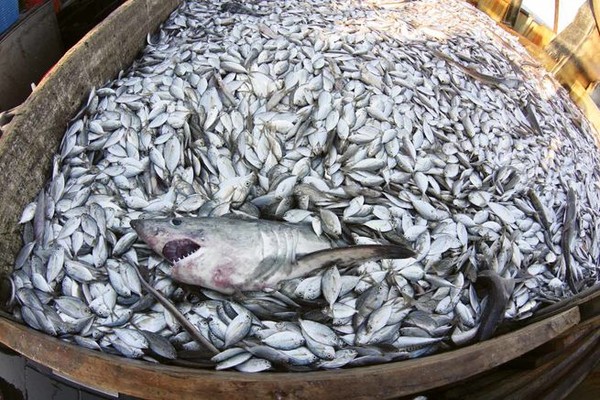The waves undulating against the hull of a fishing vessel are suddenly interrupted by a forceful tug on the line. Hastily, the fishermen retrieve their catch. Nevertheless, instead of a thriving collection of fish, they discover a tangled mess of waste debris and unwanted marine animals, the majority of which are scheduled to be discarded back into the ocean.
This tragically summarizes the act of bycatch.

Research indicates that as much as 40% of all marine life caught gets thrown right back overboard as bycatch, and the majority of them perish before they even hit the water. One of the most impacted species due to bycatch is sharks. “But sharks prey on people and are therefore a danger to us!” Fact check: sharks kill about 10 people per year, while humans kill about 11,000 to 30,000 per hour! The crazy thing is that almost half of those sharks are killed as bycatch from commercial fishing fleets. That amounts to a staggering number of approximately 50 million sharks killed due to bycatch each year. Species like the bull or hammerhead sharks have seen a drastic crash in population, losing up to 86 to 99% in just the last few decades. You may be wondering, why should we pay attention to the declining shark population?
We shouldn’t be afraid of having sharks in the ocean but quite the opposite: we should be afraid of not having them. Sharks, as the apex predators, are responsible for keeping our oceans healthy, keeping our coral reefs functioning, and keeping countless ecosystems alive. Ultimately, the loss of sharks will have detrimental consequences for us in the future. It's not a question of if, but rather a troubling question of when.
The scale of bycatch also extends beyond just sharks. Let’s talk numbers. According to the World Wildlife Fund (WWF), 300,000 whales and dolphins, 720,000 seabirds, 250,000 turtles, and 345,000 seals are also slaughtered each year as a consequence of bycatch. It is astonishing how the fishing industry utilizes the term "accidental take" to describe this appalling practice, when in actuality, this practice is not accidental in the least. It is all meticulously factored into the economics of fishing and its apparent sustainability.
One of the ways that fisheries are deemed to be sustainable is if they are labeled with sustainability certificates. Surely they must mean something, right? One of the certifications awarded is given out by the Sustainable Seafood Coalition (SSC), a collaborative enterprise co-founded by Young's Seafood, which holds a preeminent position as one of the largest seafood corporations in the world. As such, this coalition is composed of companies and brands that engage in the commercialization of seafood.
In essence, by virtue of their membership in this coalition, brands and companies are able to assert their affiliation with this sustainable coalition. But one look at their Guidance says otherwise: “This guidance is intended to help SSC members in the interpretation and implementation of the codes, and includes best practice advice. Ultimately, it is the responsibility of individual businesses to ensure alignment with the Codes.” It is baffling to me how transparent this whole issue becomes. Companies, whose primary revenue stream is derived from fishing, have created a sustainability certification. They have established their own, rather ambiguous, standards for the code of conduct. They have then shamelessly given themselves these certifications and are now claiming to be part of a sustainable fishing ecosystem. Consumers and stakeholders alike should exercise caution and thoroughly research sustainability certifications before accepting them as an accurate indicator of responsible fishing practices.
I can't help but feel a heavy weight on my chest, a sense of moral responsibility to inform and educate. Our magnificent oceans, once brimming with life from all corners of the globe, has now tragically succumbed to our ever-growing appetite for seafood. It’s not just about the unnecessary killings of sharks, whales, dolphins, turtles, and seals; it's about preserving the delicate balance of our oceans, the very source of life on this planet. It is easy to feel helpless in the face of such systemic issues, but we must not let that despair consume us. Given the lack of clarity regarding whether any company genuinely engages in sustainable fishing practices and the pervasive meaninglessness of certifications, we must adopt a radical stance and abstain from lending support to large-scale commercial fishing endeavors. We must hold ourselves and these industries accountable, demanding transparency and real change. It is high time we start taking care of our caretaker.

